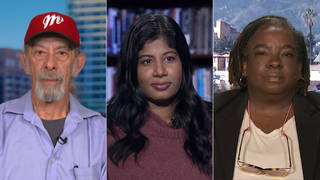By Patrick Decloitre, RNZ Pacific correspondent French Pacific desk
French Minister for Overseas Manuel Valls, who is visiting New Caledonia this week for the third time in two months, has once again called on all parties to live up to their responsibilities in order to make a new political agreement possible.
Failing that, he said a potential civil war was looming.
“We’ll take our responsibilities, on our part, and we will put on the table a project that touches New Caledonia’s society, economic recovery, including nickel, and the future of the younger generation,” he told a panel of French journalists on Sunday.
He said that he hoped a revised version on a draft document — resulting from his previous visits in the French Pacific territory and new proposals from the French government — there existed a “difficult path” to possibly reconcile radically opposing views expressed so far from the pro-independence parties in New Caledonia and those who want the territory to remain part of France.
The target remains an agreement that would accommodate both “the right and aspiration to self-determination” and “the link with France”.
“If there is no agreement, then economic and political uncertainty can lead to a new disaster, to confrontation and to civil war,” he told reporters.
“That is why I have appealed several times to all political stakeholders, those for and against independence,” he warned.
“Everyone must take a step towards each other. An agreement is indispensable.”
Valls said this week he hoped everyone would “enter a real negotiations phase”.
He said one of the ways to achieve this will be to find “innovative” solutions and “a new way of looking at the future”.
This also included relevant amendments to the French Constitution.
Local parties will not sign any agreement ‘at all costs’
Local parties are not so enthusiastic.
In fact, each camp remains on their guard, in an atmosphere of defiance.
And on both sides, they agree at least on one thing — they will not sign any agreement “at all costs”.
Just like has been the case since talks between Valls and local parties began earlier this year, the two main opposing camps remain adamant on their respective pre-conditions and sometimes demands.
The pro-independence Kanak and Socialist National Liberation Front (FLNKS), largely dominated by the Union Calédonienne, held a convention at the weekend to decide on whether they would attend this week’s new round of talks with Valls.
They eventually resolved that they would attend, but have not yet decided to call this “negotiations”, only “discussions”.
They said another decision would be made this Thursday, May 1, after they had examined Valls’s new proposals and documents which the French minister is expected to circulate as soon as he hosts the first meeting tomorrow.
FLNKS reaffirms ‘Kanaky Agreement’ demand
During their weekend convention, the FLNKS reaffirmed their demands for a “Kanaky Agreement” to be signed not later than 24 September 2025, to be followed by a five-year transition period.
The official line was to “maintain the trajectory” to full sovereignty, including in terms of schedule.
On the pro-France side, the main pillar of their stance is the fact that three self-determination referendums have been held between 2018 and 2021, even though the third and last consultation was largely boycotted by the pro-independence camp.
All three referendums resulted in votes rejecting full sovereignty.
One of their most outspoken leaders, Les Loyalistes party and Southern Province President Sonia Backès, told a public rally last week that they had refused another date for yet another referendum.
“A new referendum would mean civil war. And we don’t want to fix the date for civil war. So we don’t want to fix the date for a new referendum,” she said.
However, Backès said they “still want to believe in an agreement”.
“We’re part of all discussions on seeking solutions in a constructive and creative spirit.”
Granting more provincial powers
One of their other proposals was to grant more powers to each of the three provinces of New Caledonia, including on tax collection matters.
“We don’t want differences along ethnic lines. We want the provinces to have more powers so that each of them is responsible for their respective society models.”
Under a draft text leaked last week, any new referendum could only be called by at least three-fifths of the Congress and would no longer pose a “binary” question on yes or no to independence, but would consider endorsing a “project” for New Caledonia’s future society.
Another prominent pro-France leader, MP Nicolas Metzdorf, repeated this weekend he and his supporters “remain mobilised to defend New Caledonia within France”.
“We will not budge,” Metzdorf said.
Despite Valls’s warnings, another scenario could be that New Caledonia’s political stakeholders find it more appealing or convenient to agree on no agreement at all, especially as New Caledonia’s crucial provincial elections are in the pipeline and scheduled for no later than November 30.
Concerns about security
But during the same interview, Valls repeated that he remained concerned that the situation on the ground remained “serious”.
“We are walking on a tightrope above embers”.
He said top of his concerns were New Caledonia’s economic and financial situation, the tense atmosphere, a resurgence in “racism, hatred” as well as a fast-deteriorating public health services situation or the rise in poverty caused by an increasing number of jobless.
“So yes, all these risks are there, and that is why it is everyone’s responsibility to find an agreement. And I will stay as long as needed and I will put all my energy so that an agreement takes place.
“Not for me, for them.”
Valls also recalled that since the riots broke out in May 2024, almost one year ago, French security and law enforcement agencies are still maintaining about 20 squads of French gendarmes (1500 personnel) in the territory.
This is on top of the normal deployment of 550 gendarmes and 680 police officers.
Valls said this was necessary because “any time, it could flare up again”.
Outgoing French High Commissioner Louis Le Franc said in an interview recently that in case of a “new May 13” situation, the pre-positioned forces could ensure law enforcement “for three or four days . . . until reinforcements arrive”.
If fresh violence erupts again, reinforcements could be sent again from mainland France and bring the total number to up to 6000 law enforcement personnel, a number similar to the level deployed in 2024 in the weeks following the riots that killed 14 and caused some 2.2 billion euros (NZ$4.2 billion) in damage.
Carefully chosen words
Valls said earlier in April the main pillars of future negotiations were articulated around the themes of:
- “democracy and the rule of law”;
- a “decolonisation process”;
- the right to self-determination;
- a “fundamental law” that would seal New Caledonia’s future status;
- the powers of New Caledonia’s three provinces; and a future New Caledonia citizenship with the associated definition of who meets the requirements to vote at local elections.
Valls has already travelled to Nouméa twice this year — in February and March.
Since his last visit that ended on April 1, discussions have been maintained in conference mode between local political stakeholders and Valls, and his cabinet, as well as French Prime Minister François Bayrou’s special advisor on New Caledonia, constitutionalist Eric Thiers.
This article is republished under a community partnership agreement with RNZ.
 Thursday, May 1
Thursday, May 1 Who to vote for
Who to vote for  (@GergeNick)
(@GergeNick) 

